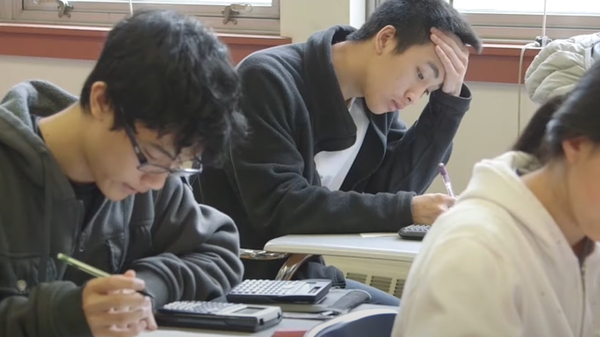College admissions are at the front of high schoolers’ minds throughout senior year. However, for some, it is not only 12th grade-- it’s all of high school. Students are put under pressure to meet their parents’, peers’, and teachers’ expectations as they set out for the next phase of their life. This stress, however, can worsen students’ mental health, as they are constantly being criticized and compared to the people around them.
Earlier this year, Arizona State University’s Project Humanities hosted an event on this exact topic. Speakers at the event discussed the effects of this competition on high schoolers’ mental health and general well-being. Some of the topics discussed came in the form of support systems, counseling, defining “success,” and college applications.
The sense of competition comes not only from outside factors like the school and peers, but also from internal pressure by the students themselves. Events like awards ceremonies or class rankings can severely demotivate students or force them to pressure themselves to achieve more. While not all of this is negative, it can be. Additionally, having the right support systems and academic environment is key to student success and well-being. The quality of high school guidance and special services counselors may also be a contributing factor to how students perceive themselves with regards to their peers and academic environment. Furthermore, the term “success” is extremely individualized and matched with each person’s goals and aspirations. What each person wants to accomplish will be different, corresponding to the differences in the “dream schools” list, as well as what “rejection” and “failure” mean for a diverse group of students. Finally, there have been many discussions about whether college admissions are “fair,” or whether they are able to match each school with the group of students that “deserve” or are “best-fitted” to go there. But is there really a way to make this system as fair as it was meant to be?
Another focus of this event was the short film titled “Try Harder!” This film depicted how various kids at the #1 public school in the San Francisco area dealt with the pressure of college applications. The film followed a few key students, giving the audience a glimpse of their trials and tribulations as they persevered towards the institutions they would end up attending the following year.
The students in the film are supposed to be representative of high schoolers around the country, each with their own sense of individuality, purpose, and skillset. In addition to what college admissions officers see, students have hobbies, passions, and personalities that are not fully reflected in their applications. The students in the film, despite being academically-motivated, also pursue passions such as acting, dancing, and art. Their personalities are also showcased; some students are not afraid to make fun of themselves, some are so funny they could make even the grumpiest of ppl laugh, some are the most compassionate and caring people you will ever meet, but none of that gets displayed by their college applications.
Recently, more colleges have been switching to test-optional and adopting a more holistic application review process. What does this mean? Being test-optional would mean that the institution allows applicants to decide whether or not to submit test scores (ACT/SAT), and that the students’ decisions do not impact their applications; on the other hand, having a holistic application review system would entail looking at various different pieces of a student’s application to make a decision (rather than basing application decisions solely on academics).
Making these changes to the college applications process definitely does lighten the load and stress students experience, but is it enough? Even holistic applications fail to capture who students are as people, but this issue is something that could take much longer to fix. There is still the pressure of measuring up to other students academically, which will always be an unintended consequence of high school and college admissions. The holistic application, as well as making the switch to best test-optional, may be two large stepping stones on the way to a “fair” admissions process.
On a brighter note, instead of trying to change something that will always have these negative consequences, an alternate approach may be to focus on the students and help them through the process. This is a more student-centered approach, which tackles the root of the problem-- how students cope.
At the end of the day, college is subjective. College is made out to be the end-all be-all, but is that really the case? The value gained from college needs to be put in perspective with student debt and the worsened mental health it took to get there. Every person has their own unique situation that can not be measured, quantified, or summed up in a small college application, and it is crucial for people to realize that.
For a trailer of the film, click here

